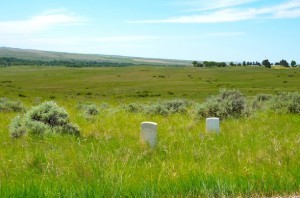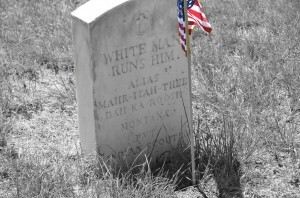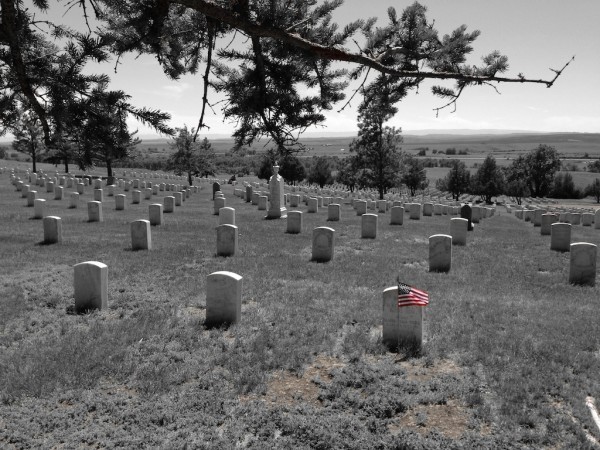Reflections from the Little Bighorn Battlefield Nat’l Monument
 When you pull into Montana’s Little Bighorn Battlefield National Monument, your senses are certain to be instantly sobered by a large national cemetery where American soldiers are interred from various indian battles fought in the northwest, and even soldiers all the way up to the Korean War.
When you pull into Montana’s Little Bighorn Battlefield National Monument, your senses are certain to be instantly sobered by a large national cemetery where American soldiers are interred from various indian battles fought in the northwest, and even soldiers all the way up to the Korean War.
But perhaps even more sobering are the hundreds of white burial markers (white man), and red burial markers (red man) that are strewn over hundreds of acres of this expansive Montana plain.
For it was in these very plains, in 1886, that the Battle of Little Bighorn took place and General Custer and the men of the 7th Calvary all met their death at the hands of various tribes of plains native indians in a skirmish not only for land, but for a way of life.
America was celebrating her 100th birthday, and the massive movement of white Europeans to the west was forcing the native peoples to battle and ultimately onto reservations.
The great problem was that America was in the throws of a deep recession and the talk of “gold in them thar hills” found prospectors by the thousands traipsing onto reservation lands showing a deep disrespect for treaties between the U.S. and the various local tribes.
Ultimately, this lead to the Little Bighorn massacre. As you might imagine, most of America was incensed, and a great number of troops chased Sitting Bull into Canada. However, facing starvation in Canada, Sitting Bull ultimately surrendered and the Native Americans were ultimately forced onto much smaller reservations in the Montana plains.
 As I stood on these plains and considered the actions that took place here over 125 years ago, I found myself saddened that a better solution to this inevitable clash couldn’t have been found. America was growing, and frankly, the Native American’s way of life stood in the way.
As I stood on these plains and considered the actions that took place here over 125 years ago, I found myself saddened that a better solution to this inevitable clash couldn’t have been found. America was growing, and frankly, the Native American’s way of life stood in the way.
Unsurprisingly, this issue is a very touchy subject. When we discussed this on our Facebook page, on lady said, “Christopher Columbus was America’s first illegal immigrant”, while another person quipped, “no change without turmoil”. Perhaps both have a measure of truth and that is why this sad battle lies forever staining our history books.
I found this article from Harper’s Magazine (August 5, 1886) to be enlightening as to the mood of the day:
“The fate of the brave and gallant Custer has deeply touched the public heart, which sees only a fearless soldier leading a charge against an ambushed foe, and falling at the head of his men and in the thick of the fray. A monument is proposed, and subscriptions have been made. But a truer monument, more enduring than brass or marble, would be an Indian policy intelligent, moral, and efficient. Custer would not have fallen in vain if such a policy should be the result of his death. It is a permanent accusation against our humanity and ability that over the Canadian line the relations between the Indians and whites are so tranquil, while upon our side they are summed up in perpetual treachery, waste, and war. When he was a young lieutenant on the frontier, General Grant saw this, and watching attentively, he came to the conclusion that the reason of the difference was that the English respected the rights of the Indians and kept faith with them, while we make solemn treaties with them as if they were civilized and powerful nations, and then practically regard them as vermin to be exterminated. The folly of making treaties with the Indian tribes may be as great as treating with a herd of buffalo. But the infamy of violating treaties when we have made them is undeniable, and we are guilty both of the folly and the infamy.
We make treaties-that is, we pledge our faith-and then leave swindlers and knaves of all kinds to execute them. We maintain and breed pauper colonies. The savages who know us and who will neither be pauperized nor trust our word we pursue and slay if we can at an incredible expense. The flower of our young officers is lost in inglorious forays, and one of the intelligent students of the whole subject rises in Congress and says, “The fact is that these Indians, with whom we have made a solemn treaty that their territory should not be invaded, and that they should receive supplies upon their reservations, have seen from one thousand to fifteen hundred miners during the present season entering and occupying their territory, while the Indians, owing to the failure of this and the last Congress to make adequate appropriations for their subsistence, instead of being fattened, as the gentleman says, by the support of the government, have simply been starved.” The Red Cloud investigation of last year, however inadequate, sufficed to show the practice under our Indian policy, and we regretted then that ex-Governor Bullock of Massachusetts declined the appointment upon the commission, because there was evidently the opportunity of an exhaustive report upon the whole subject, which should have commanded the attention of the country, and would sooner or later have led to some decisive action.
It is plain that so long as we undertake to support the Indians as paupers, and then fail to supply the food; to respect their rights to reservations, and then permit the reservations to be overrun; to give them the best weapons and ammunition, and then furnish the pretext of their using them against us; to treat with them as men, and then hunt them like skunks-so long we shall have the most costly and bloody Indian wars, and the most tragical ambuscades, slaughters, and assassinations. The Indian is undoubtedly a savage, and a savage greatly spoiled by the kind of contact with civilization which he gets at the West. There is generally no interest whatever in him or his fate. But there should be some interest in our own good faith and humanity, in the lives of our soldiers and frontier settlers, and in the taxation to support our Indian policy. All this should certainly be enough to arouse a public demand for a thorough consideration of the subject, and the adoption of a system which should neither be puerile nor disgraceful, and which would tend to spare us the constant repetition of such sorrowful events as the slaughter of Custer and his brave men.” (Link: Digital History)
You know, travel is a lot of things, but one thing that travel will do is make you stand face to face with history. And perhaps when we do so, we’ll be the better for it.
Today, on the Little Bighorn Battlefield, there stands a memorial to the fallen men of the 7th Calvary, and on a neighboring hill there is also a beautiful memorial remembering our Native American friends as well. That pleased me.
Link: Little Bighorn Battlefield National Monument
If you enjoyed this article, sign up for our monthly newsletter to keep abreast of our best travel tips, on-location reviews, exclusive travel offers, group travel events, and much more.

 The Roaming Boomers
The Roaming Boomers




